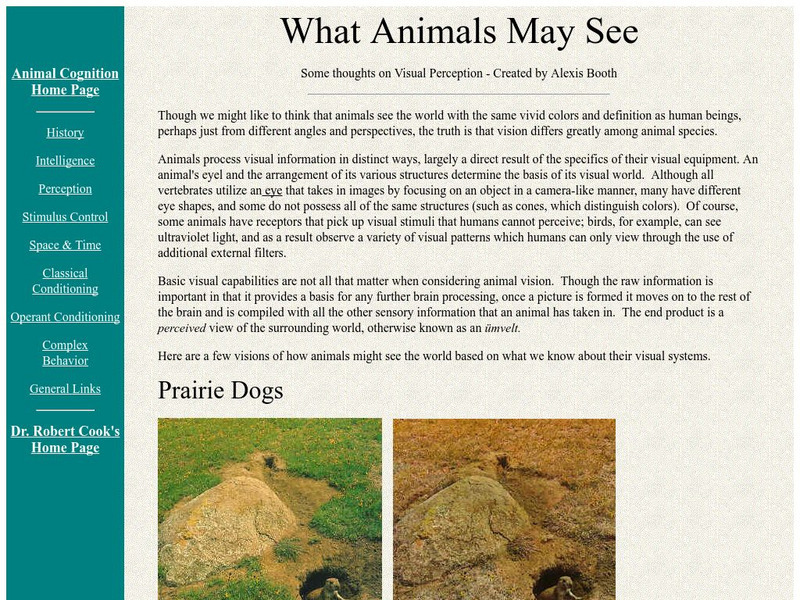Hi, what do you want to do?
Curated OER
What is Cultural Evolution?
Students comprehend what is meant by Cultural Evolution and that it primarily applies at Human Evolution, but that there are examples in higher mammals such as a killer whales, dolphins and great apes of particular groups by exploring...
Curated OER
Making Your Own Sampling Tools
Students examine cause-and-effect relationship between human attitudes and behavior in the environment. They also assist citizens in increasing their sensitivity and stewardship for the environment.
Curated OER
Escape! Survival of the Fittest Grasshopper
Fourth graders, in groups, design a paperclip grasshopper. They determine its ability to survive a prey by jumping high, far, or with a distracting behavior.
Curated OER
This Stuff Makes Me Sick
Students participate in a lab showing the effects of pesticides on Lumbriculus variegatus. Several extensions and variations are also included in this lesson including one which relates the experiment to how pesticides enter our drinking...
Discovery Education
Sonar & Echolocation
A well-designed, comprehensive, and attractive slide show supports direct instruction on how sonar and echolocation work. Contained within the slides are links to interactive websites and instructions for using apps on a mobile device to...
Curated OER
Ecosystems and Remote Sensing
Students obtain remote sensing data to compare and contrast global biomass data with global temperature data.
Teach Engineering
Exploring Capillary Action
Explore capillary action from different perspectives. In the fourth installment of a nine-part series, scholars perform several experiments to observe capillary action. They look at the meniscus of water in a glass, observe capillary...
Code.org
Introduction to Digital Assistant Project
How does a computer recognize voice commands? Scholars learn about digital assistants and natural language processing (NLP) algorithms in the ninth lesson plan of the series. They begin building a simple digital assistant and work on...
Sea World
Marine Animal Husbandry and Training
Step into the role of a zoo director with several activities about animal training and running a zoo. Kids calculate the amount of food each animal needs, design a habitat for penguins, decide how to breed bottlenose dolphins, and train...
Curated OER
1984, by George Orwell - Fact or Fantasy?
Students read 1984 by George Orwell. They research a country who has dictators similar to Oceania's leaders and create a outline for a paper. In addition, they create a web page from their information.
Curated OER
Frog Dissection Lesson Plans
Check out these lesson plans for both actual and virtual frog dissections.
Curated OER
Exercise and Heartrate
Fourth graders experiment to find the effects of exercise on the heart rate. In this exercise and heart rate lesson, 4th graders create questions about exercise and heart rate. Students use the scientific method to test and analyze...
Curated OER
Photographical Ecology
Students study organisms and the roles they play in nature. In this ecology lesson, students photograph several examples of organisms during a nature walk. Students print out their photos and classify the organisms as plants or animals.
Curated OER
Using Abiotic and Biotic Parameters to Monitor Air Quality
Students identify the abiotic factors that influence a river or stream and the organisms that live in it. They measure several abiotic and biotic parameters to gauge water quality. Students examine the biotic environment by identifying...
Curated OER
Applied Evolution: How Will We Get There from Here?
Students explore the basic process of natural selection and how people can manipulate that process today. The consequences of natural selection on daily life and the implications of evolutionary biology in basic and applied science is...
Curated OER
Turtle Sightings
Third graders research turtles and the ways they have adapted to their marine environment. They work in groups and publish their findings using SiteMaker a web-authoring tool.
Curated OER
Underwater Habitats
Students make a hydrophone and attach it to their Sea Perch ROVs. They use the hydrophones in conjunction with the underwater cameras on the ROVs to explore their local aquatic environments.
Other
Comparative Cognition Lab: What Animals May See
Animals process visual information in distinct ways and vision differs greatly among animal species. Take a look at what what different species of animals may see compared to what we as humans see.





















